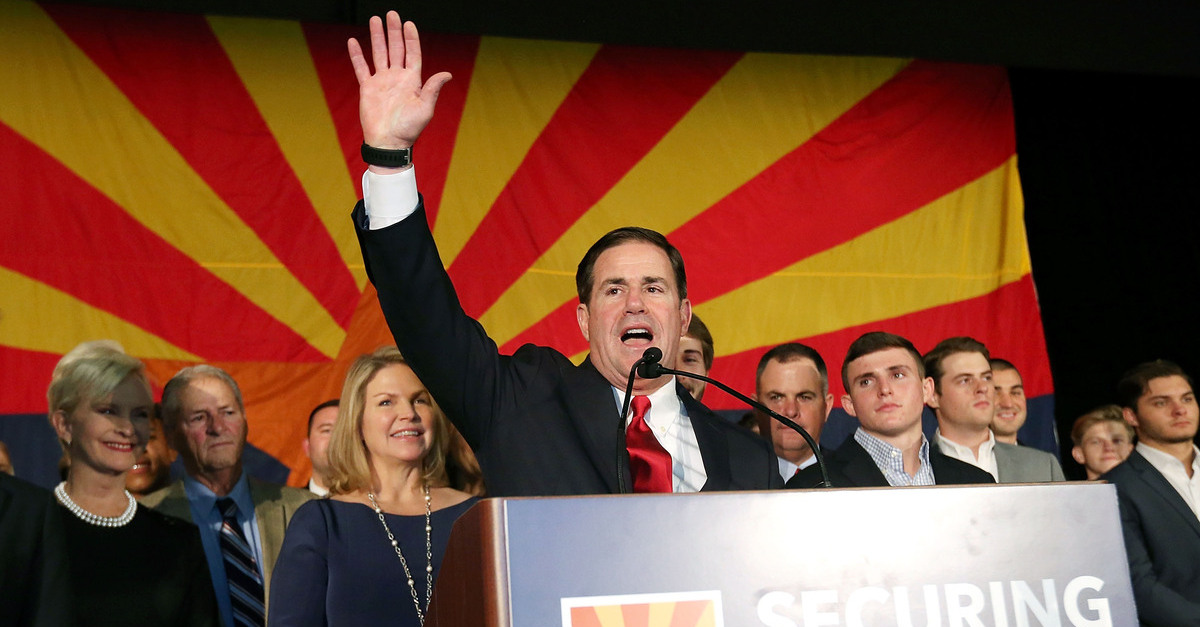
SCOTTSDALE, AZ – NOVEMBER 06: Republican Gov. Doug Ducey celebrates his victory at an election night event for Arizona GOP candidates on November 6, 2018 in Scottsdale, Arizona.
The American Civil Liberties Union and media outlets on Tuesday sued Arizona over a controversial new law that bans citizens from filming law enforcement within eight feet of a government agent.
Passed earlier this year and signed into law by Gov. Doug Ducey (R), HB 2319 makes it a crime to record law enforcement encounters within that spatial limit after receiving one warning. People who violate the statute are subject to misdemeanor charges.
The law reads, in relevant part:
It is unlawful for a person to knowingly make a video recording of law enforcement activity if the person making the video recording does not have the permission of a law enforcement officer and is within eight feet of where the law enforcement activity is occurring. iIf the law enforcement activity is occurring in an enclosed structure that is on private property, a person who is authorized to be on the private property may make a video recording of the activity from an adjacent room or area that is less than eight feet away from where the activity is occurring, unless a law enforcement officer determines that the person is interfering in the law enforcement activity or that it is not safe to be in the area and orders the person to stop recording or to leave the area.
Stylized as Arizona Broadcasters v. Brnovich, the 16-page lawsuit seeks to stop HB 2319 from taking effect and challenges the new prohibition as an unconstitutional violation of the First Amendment.
“On its face, this statute infringes the clearly established First Amendment rights of Plaintiffs and everyone else in Arizona to record the public activities of law enforcement officers,” the lawsuit filed in federal court argues. “By allowing police officers to arrest and punish people for simply recording video of their actions, the law creates an unprecedented and facially unconstitutional content-based restriction on speech about an important governmental function.”
Seeking a preliminary and permanent injunction, the filing says it aims “to prevent Arizona from trampling” on the First Amendment rights of the media and others to “report news, document the activities of public servants, and hold police accountable for their actions toward the people they are sworn to protect and serve.”
The lawsuit notes that HB 2319 was passed despite public warnings from Arizona Senate Rules attorney Chris Kleminich that the law “does bring up questions relating to First Amendment and freedom of expression” because “recording of law enforcement activity has been recognized by federal courts as following within that First Amendment right” and that there were “reasons to be concerned about how a court will ultimately rule on this measure.”
In no uncertain terms, the lawsuit says HB 2319 “infringes” on “core newsgathering activities protected by the First Amendment” and also infringes “the First Amendment rights of all people in Arizona to record the activities of police.” The upshot of the law taking effect, the ACLU attorneys warn in the filing, is that “anyone” in Arizona risks “arrest and prosecution if they video record law enforcement activity.”
The filing goes on to argue that compliance will be close to impossible and that the law itself is irredeemably vague:
[A]mbiguity arises with respect to what constitutes a “verbal warning,” and the length of time that satisfies the requirement of “previously.” If a journalist or member of the public is warned to stop recording the day before, it is unclear if they can be arrested for a violation twenty-four hours later. If one officer allows a journalist or member of the public to record from where they are standing, it is unclear if another officer can come up to the journalist or member of the public, tell them to stop recording, and then arrest them if they don’t comply fast enough.
Public recording of law enforcement has become a hot-button issue for political conservatives, in this case in Arizona. After George Floyd’s recorded murder by a Minneapolis police officer galvanized the Black Lives Matter movement during the summer of 2020, calls for clamping down on speech near law enforcement activity gained steam.
“At a time when the public is demanding police accountability, Arizona wants to criminalize the public’s most effective tool for shining a light on police violence,” ACLU of Arizona Legal Director Jared Keenan said in a statement. “This law is not only unconstitutional, it is bad public policy.”
Law&Crime reached out to Arizona AG Brnovich’s office for comment in response to the lawsuit.
The full filing is available below:
[image via Ralph Freso/Getty Images]
Have a tip we should know? [email protected]